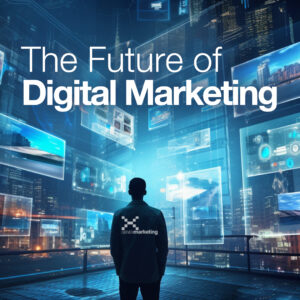The future of digital marketing is an exciting realm filled with emerging trends and cutting-edge technologies. As technology continues to advance at an unprecedented pace, businesses must stay ahead of the curve to leverage the latest tools and strategies to thrive in the competitive online space. In this blog, we will explore some of the key trends and technologies shaping the future of digital marketing.
Artificial Intelligence (AI) and Machine Learning (ML):
AI and ML are revolutionizing the way digital marketers operate. From chatbots and virtual assistants to predictive analytics and personalization, AI-driven technologies enable businesses to enhance customer experiences and optimize marketing efforts. AI-powered algorithms can analyze vast amounts of data, providing valuable insights to tailor marketing campaigns and improve targeting accuracy.
Voice Search Optimization:
With the increasing popularity of voice assistants such as Amazon Alexa and Google Assistant, voice search is rapidly becoming a dominant force in digital marketing. Optimizing content for voice search queries requires a conversational tone and targeting long-tail keywords. Marketers should adapt their strategies to cater to voice search, ensuring their brands remain visible in this evolving landscape.
Video Marketing:
Video content continues to dominate online platforms, and its importance will only grow in the future. Brands must embrace video marketing to engage audiences effectively. Live streaming, interactive videos, and virtual reality experiences provide immersive and memorable ways to connect with consumers. Video content also offers excellent opportunities for storytelling, building brand awareness, and increasing conversions.
Influencer Marketing:
Influencer marketing has evolved into a mainstream strategy, and it will continue to thrive in the future. Consumers trust recommendations from influencers they admire, making it a valuable avenue for brands to reach their target audience authentically. However, the focus is shifting towards micro-influencers who have a more niche following, as they often have higher engagement rates and foster stronger connections with their audience.
Augmented Reality (AR) and Virtual Reality (VR):
AR and VR technologies are revolutionizing the way consumers experience products and services. From virtual try-ons to immersive brand experiences, AR and VR offer limitless possibilities for engaging customers. Businesses can utilize these technologies to showcase their products, allow virtual test-drives, or create interactive branded experiences that captivate and convert consumers.
The future of digital marketing is a thrilling landscape of emerging trends and technologies. By staying informed and adapting to these advancements, businesses can gain a competitive edge and unlock new opportunities for growth. From leveraging AI and ML for data-driven decision-making to embracing voice search optimization and immersive experiences through AR and VR, the possibilities are endless. It is vital for digital marketers to stay agile, experiment with new strategies, and embrace the power of technology to connect with consumers in meaningful and innovative ways. The future is here, and those who embrace it will shape the digital marketing landscape for years to come.


